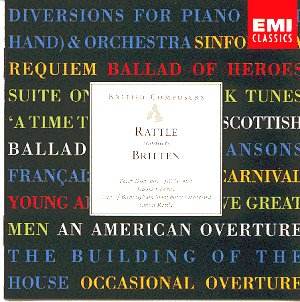Benjamin BRITTEN (1913 -
1976)
An American Overture Op.27* 10'27"
Ballad of Heroes. Op. 14** 16'31"
Diversion for Piano (left hand) and Orchestra Op.21**
23'30"
The Building of the House - Overture Op. 79**
5'05"
Praise we Great Men (1976)** 7'22"
Suite on English Folk Tunes: "A time there was...." Op. 90*
14'44"
Canadian Carnival Op. 19*** 14'02
Young Apollo Op. 16*** 7'37"
Quatre Chansons Francaises (1928)*** 12'36"
Scottish Ballad Op. 26*** 15'15"
Occasional Overture Op. 38* 7'12"
Sinfonia da Requiem Op. 20*
20'29"
 Peter Donohoe (pno) Jill Gomez
(soprano) City of Birmingham Symphony Orchestra CBSO Chorus Sir Simon
Rattle
Peter Donohoe (pno) Jill Gomez
(soprano) City of Birmingham Symphony Orchestra CBSO Chorus Sir Simon
Rattle
 Recorded Warwick Arts Centre
23/24 May 1984* 15-17 July 1990** Cheltenham Town Hall 22/23 April 1982 DDD
Recorded Warwick Arts Centre
23/24 May 1984* 15-17 July 1990** Cheltenham Town Hall 22/23 April 1982 DDD
EMI CLASSICS British Composers CZS 5 73983 2 CD1 [78'07] CD2
[77'34"]
Crotchet
Amazon
UK Amazon USA approx £13

EMI in their British Composers Series offers a generously filled pair of
discs with Simon Rattle and the CBSO playing music by Benjamin Britten. The
selection has chosen to avoid the years when he was at his composing peak,
those being from about 1945 to the mid-sixties, and the CDs are therefore
mainly early works - up to and including Britten's time in North America
in the early1940's - with a couple of late occasional pieces to represent
his final years. The recordings are full of interest thoughout, and there
are a couple of "Must hear again" works. Britten admirers should be able
to fill a gap or two in their collections.
Taking the pieces in the playing order - they are not chronological - An
American Overture from 1941 is a high-powered work, brilliantly scored,
with Britten appearing to revel in the sound possibilities a big orchestra
offers. Ballad of Heroes from 1939 is a three-part work written to
reflect Britten's left wing views as a tribute to British dead on the republican
side in the Spanish civil war. In three parts, it uses a chorus and a tenor
and has undoubted pre-echoes of the War Requiem at times. A wickedly fast
opening to the middle movement scherzo challenges the chorus, and
Robert Tear is an expressive soloist.
Diversions for piano (left hand) and Orchestra was written in 1940
during Britten's time in America for the pianist Paul Wittgenstein (brother
of the philosopher) who had lost his right arm in World War I. It
is made up of eleven variations on a theme and is a inventive and challenging
work. Superbly played by Peter Donohoe it deserves to be heard more often
in live performance. The Building of the House, written in 1967 to
mark the opening of the Snape Maltings (the one that burned down) is an
occasional piece yet even that shows the composer's orchestration skills.
All through the discs one is constantly aware of Britten's handling of whatever
forces he is writing for. The variety of orchestration he employs for even
the slightest of subjects is staggering.
Praise We Great Men is a work for orchestra and vocal quartet that
Britten did not finish before his death. The completion was by Colin Matthews.
Short, in three sections, it is hauntingly beautiful at times, notably in
the middle section with the tenor (reminders of Pears) and soprano with words
by Edith Sitwell. In many things Britten was a traditionalist and his delightful
Suite on English Folk Tunes: A Time there was..... dedicated to Percy
Grainger and dating from 1974 shows this.
Canadian Carnival is an extended piece from 1939 to mark the composer's first
impressions of that enormous country. Following an extravagant introduction
he chose to set most of the work in dance-like form basing the sections upon
folksongs - a convoluted Alouette making an appearance. Copland comes
to mind, even though Rodeo and Appalachian Spring were still
to be written. Young Apollo, also from Canada in 1939, was quickly
withdrawn by the composer after its first performance for reasons that were
not made clear. The piano part throughout is prominent and he uses a string
quartet and orchestra (extravagantly in a work just over 7 minutes long).
Britten was 14 when he wrote his Quatres Chansons Francaises. He sets
songs by Verlaine and Hugo in unbelievably mature writing with clear touches
of Ravel. Jill Gomez is a magnificent soloist in the set of which I especially
liked Sagesse the second , and Chanson d'automne. This set
and the Peter Donohoe's Left Hand Diversions are probably, with the
closing Sinfonia, the pick of the issue. Scottish Ballad from
1941 was written for two pianos and orchestra while Britten was in America.
The closing section uses a reel and it proves welcome after rather heavy
going in the preceding hymn tune and funeral based writing. Occasional
Overture, to mark the opening of the Third programme in 1946 is again
brilliantly scored if empty.
The best-known work, and the longest is Sinfonia da Requiem of 1940. Written
as a commission for an initially unknown sponsor that turned out to be the
Japanese Royal Family, confusion and misunderstanding dogged its early days.
The Rattle recording has been released previously and is a passionate, intense
reading of this deeply felt work. A full blooded recording matches the
performance.
Throughout these two CDs I was constantly aware that whatever the value of
the work Britten was writing, be it a commissioned pot-boiler or something
more, then his imaginative scoring and technical mastery must be admired.
There is a wealth of good music on these two discs. Highly recommended.
Reviewer
Harry Downey

